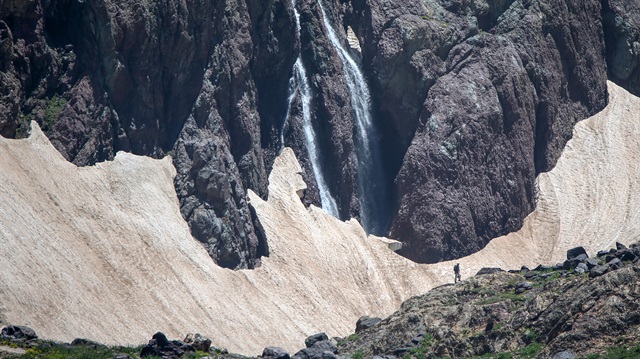
Such events are just the start, said glacier expert and PMD head Ghulam Rasul.
"The disasters caused by glacier outbursts in these areas will not stop here. They will continue in the future because there are so many glaciers at risk of bursting," he told the Thomson Reuters Foundation.
Years of deforestation, combined with climate change, have led to a spike in temperatures in the region, which has caused glaciers to melt, Rasul said.
Over the past 80 years, he said, the average temperature in Gilgit-Baltistan has increased by 1.4 degree Celsius (2.5F) compared to a rise of 0.6 degree Celsius (1F) in the lower-lying regions of Sindh, Punjab and Khyber-Pakhtunkhwa.
Poor government management of forests and increased demand for timber have seen trees cut down, he said - even though conserving forests is essential in order to absorb carbon emissions and fight climate change.
"Global warming has direct implications on mountainous areas in northern Pakistan because of forest loss. Deforestation happened due to the negligence of authorities since people would cut trees for construction and fuel," Rasul said.
"The essential thing to do is to grow more forests to mitigate the effects of global warming on glaciers in future."
Local authorities said rejuvenating the forest is a priority, but replenishing the area would take time.
"The provincial government has already launched a campaign to grow the forest, among other solutions, to offset the rapid increase in temperatures in these mountains," local government spokesman, Faizullah Faraq, told the Thomson Reuters Foundation.
With help from the U.N. International Fund for Agricultural Development (IFAD), Faraq said, the authorities were also developing infrastructure in nearby areas in case residents of vulnerable villages were forced to relocate.
"This is a big challenge and not a matter to resolve overnight, but we are moving in that direction," he said.
Rasul said the PMD had installed early warning systems in three areas to notify vulnerable communities of any glacial threats, adding that more were needed so to provide sufficient advance warning ahead of the next event.
And, he said, the PMD recommends that communities be better trained in coping with emergency situations.
Meantime all that villager Baz can do, he said, was pray that his family would survive another day.
"I worry about the future and how to feed my family, since I lost my land and my job ended too. I pray that God will save us from more natural disasters," he said.














